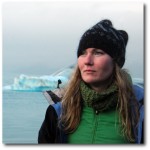The National Oceanic and Atmospheric Administration (NOAA) issued its annual Arctic Report Card today, and no time might seem more crucial than now as the world grapples with the natural, physical and socio-political aspects of climate change. NOAA released the report card to the media and the public via a call-in webinar on Thursday, Dec. 1. Karen Frey, assistant professor of geography in the Graduate School of Geography at Clark University, contributed to the 2011 Arctic Report Card’s collection of scientific essays, along with an international team of 121 scientists from 14 countries. On Thursday, she was on a panel of three distinguished researchers who presented the live webinar and conducted a Q&A session with reporters from the Associated Press, Reuters, ClimateWire, and others.
* Click here to view the 2011 Arctic Report Card and watch a video. *
Monica Medina, principal deputy undersecretary for Oceans and Atmosphere at NOAA made opening remarks. Other key panelists were Howie Epstein of the University of Virginia, who reported on vegetation, and Don Perovich of the U.S. Army Engineer Research and Development Center (ERDC) Cold Regions Research and Engineering Laboratory in Hanover, N.H., who talked about sea ice. Frey focused on how dramatic declines in Arctic sea ice are resulting in increased primary productivity of phytoplankton, and the important consequences to ecosystems and the food chain.

The key points summarized in the report: “Persistent warming has caused dramatic changes in the Arctic Ocean and the ecosystem it supports. Ocean changes include reduced sea ice and freshening of the upper ocean, and impacts such as increased biological productivity at the base of the food chain and loss of habit for walrus and polar bears.” Professor Frey has been involved in several expeditions to study climate change in the Arctic. For the past two years, she has been part of NASA’s multi-year ICESCAPE (Impacts of Climate change on the Eco-Systems and Chemistry of the Arctic Pacific Environment) project, conducting research from aboard the U.S. Coast Guard Cutter Healy in waters off Alaska’s northern shores. She is a principal investigator and led select Clark undergraduates in “The Polaris Project: Rising Stars in the Arctic” (National Science Foundation, International Polar Year), a field course in eastern Siberia to study the hydrological and biogeochemical impacts of climate warming and permafrost thaw.
* Visit Prof. Frey’s Polar Science Research Laboratory blog, here. *
Issued annually, the Arctic Report Card is a timely source for clear, reliable and concise environmental information on the state of the Arctic, relative to historical time series records. Some of the essays are based upon updates to articles in the Bulletin of the American Meteorological Society State of the Climate in 2009. The Arctic Report Card is collaboratively supported by the international Arctic Council. The Conservation of Arctic Flora and Fauna (CAFF) Circumpolar Biodiversity Monitoring Program (CBMP) provides collaborative support through the delivery and editing of the biological elements of the Report Card. The audience for the Arctic Report Card is wide, including scientists, students, teachers, decision makers and the general public interested in Arctic environment and science. The web-based format facilitates future timely updates of the content. Support for the Report Card is provided by the NOAA Climate Program Office through the Arctic Research Program. Jackie Richter-Menge is the chief editor of the Arctic Report Card.


